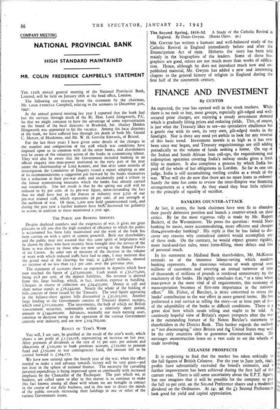FINANCE AND INVESTMENT
By CUSTOS
As expected, the year has opened well in the stock markets. While there is no rush to buy, most groups, especially gilt-edged and well- secured prior charges, are enjoying a steady investment demand which is gradually lifting prices and reducing yields. This, of course, is just what the Treasury likes to see—no speculative ebullience but a gentle rise with its own, its very own, gilt-edged stocks in the limelight. Nor is there any need yet awhile to look for any reversal of this basic trend. Investment morale is as high as it has ever been since war began, and Treasury requisitionings are still adding periodically to the volume of funds seeking a home. On top of the Indian and South African loan call-ups, the requisitioning and redemption operation covering India's railway stocks gives a fresh fillip to markets. It also completes a process by which India has paid off the whole of her obligations in London. So far as one can judge, India is still accumulating sterling credits as a result of the war. What will she do now that there are no more loans to redeem? Surely the time has come to review the inter-Empire war financing arrangements as a whole. As they stand they bear little relation to the principle of equality of sacrifice.
BANKERS COUNTER-ATTACK At last, it seems, the bank chairmen have seen fit to abandon their purely defensive position and launch a counter-attack on their critics. By far the most vigorous sally is made by Mr. Rupert Beckett, of the Westminster. l'He poses the question: would State banking be easier, more accommodating, more efficient and cheaper than.present-day banking? His reply is that he has failed to dis- cover any reasons why centralised control would accomplish any of these ends. On the contrary, he would expect greater rigidity, more hard-and-fast rules, more form-filling, more delays and loss of personal touch.
In his statement to Midland Bank shareholders, Mr. McKenna reminds us of the immense labour-saving which modern banking represents. An enormous volume of work spread over millions of customers and covering an annual turnover of tens of thousands of millions of pounds is rendered unnecessary by the machinery of the banks. He rightly concludes that, " at a time when man-power is the most vital of all requirements, this economy of mass-operation becomes of first-rate importance in the national effort." Mr. Fisher, of Barclays, is more concerned to stress the banks' contribution to the war effort in more general terms. He has performed a real service in telling the story—or at least part of it— of the adaptability of the banks to difficult conditions. There is a great deal here which needs telling and ought to be told. A cautiously hopeful view of Britain's export prospects after the war is the outstanding feature of Sir Noton Barclay's statement to shareholders in the District Bank. This banker regards the outlook as " not discouraging," since Britain and th,s United States may well be the only countries able to guarantee international loans. He envisages reconstruction loans on a vast scale to set the wheels of trade revolving.
CELANESE PROSPECTS
It is surprising to find that the market has taken unkindly to the full figures of British Celanese. For the year to June 30th, 1942, profits have substantially exceeded the board's estimates, and a further improvement has been achieved during the first half of the current year. There is still some uncertainty about the E.P.T. figure, but one imagines that it will be possible for the company to pay the full to per cent. on the Second Preference shares and a moderate dividend on the Ordinaries. At 24s. 9d. the £i Second Preferences look good for yield and capital appreciation.


























 Previous page
Previous page